The right Flutter developers craft the user interfaces and functionalities of mobile applications using Google's Flutter framework. Their role is pivotal in building cross-platform apps with a single codebase, which look and feel great on both Android and iOS devices.
Flutter development skills encompass a range of competencies from Dart programming language to understanding the nuances of the Flutter framework itself. Additionally, skills like effective communication and quick problem-solving are important.
Candidates can write these abilities in their resumes, but you can’t verify them without on-the-job Flutter Developer skill tests.
In this post, we will explore 9 essential Flutter Developer skills, 11 secondary skills and how to assess them so you can make informed hiring decisions.
Table of contents
9 fundamental Flutter Developer skills and traits
The best skills for Flutter Developers include Dart Programming, Flutter Framework, State Management, UI/UX Design, API Integration, Version Control, Testing and Debugging, Responsive Design and Firebase Integration.
Let’s dive into the details by examining the 9 essential skills of a Flutter Developer.
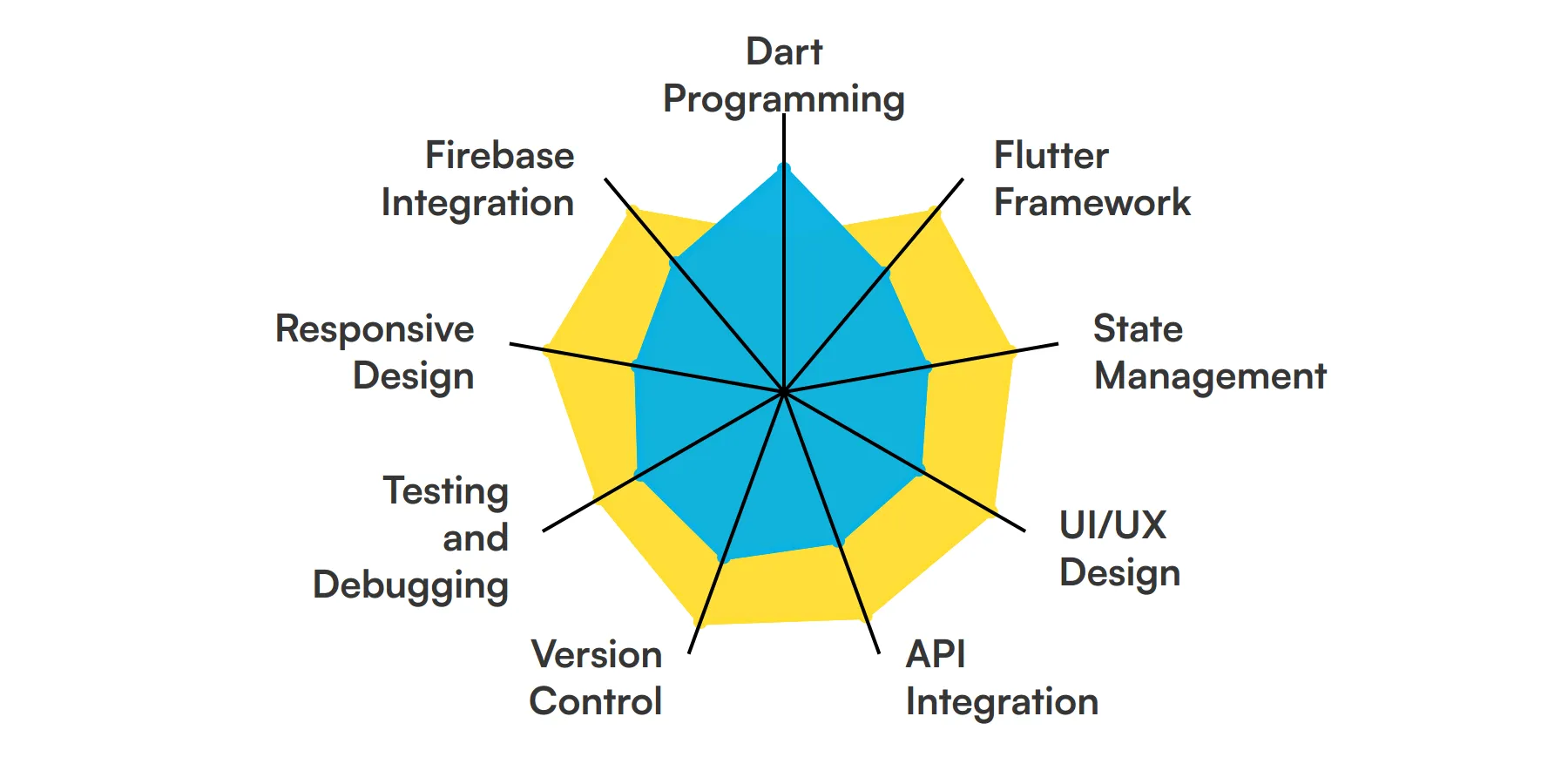
Dart Programming
Dart is the primary language used for Flutter development. A Flutter developer must be proficient in Dart to write clean, efficient, and maintainable code. Understanding Dart's syntax and features is crucial for building robust Flutter applications.
Check out our guide for a comprehensive list of interview questions.
Flutter Framework
A deep understanding of the Flutter framework is essential. This includes knowledge of widgets, state management, and the Flutter rendering process. A Flutter developer uses this skill to create responsive and visually appealing user interfaces.
State Management
Managing the state of an application is a core aspect of Flutter development. Familiarity with state management solutions like Provider, Riverpod, or Bloc helps in maintaining a predictable and scalable app architecture.
UI/UX Design
A good grasp of UI/UX principles is important for creating intuitive and user-friendly applications. Flutter developers often work closely with designers to implement custom designs and ensure a seamless user experience.
For more insights, check out our guide to writing a UI/UX Designer Job Description.
API Integration
Integrating APIs is a common task for Flutter developers. This involves fetching data from remote servers, handling JSON responses, and ensuring smooth communication between the app and backend services.
Version Control
Proficiency with version control systems like Git is necessary for managing codebases, collaborating with team members, and tracking changes. This skill ensures that the development process is organized and efficient.
Check out our guide for a comprehensive list of interview questions.
Testing and Debugging
Testing and debugging are critical for delivering high-quality applications. A Flutter developer should be skilled in writing unit tests, widget tests, and integration tests to ensure the app functions as expected and is free of bugs.
Responsive Design
Creating applications that work seamlessly across different devices and screen sizes is a key skill. Flutter developers use responsive design techniques to ensure their apps provide a consistent experience on both mobile and web platforms.
Firebase Integration
Firebase provides a suite of tools for app development, including authentication, cloud storage, and real-time databases. Knowledge of Firebase integration can significantly enhance the functionality and scalability of Flutter applications.
11 secondary Flutter Developer skills and traits
The best skills for Flutter Developers include Animation Techniques, CI/CD Pipelines, Database Management, Security Best Practices, Performance Optimization, Cross-Platform Development, Accessibility, Code Review, Package Management, Networking and Localization.
Let’s dive into the details by examining the 11 secondary skills of a Flutter Developer.
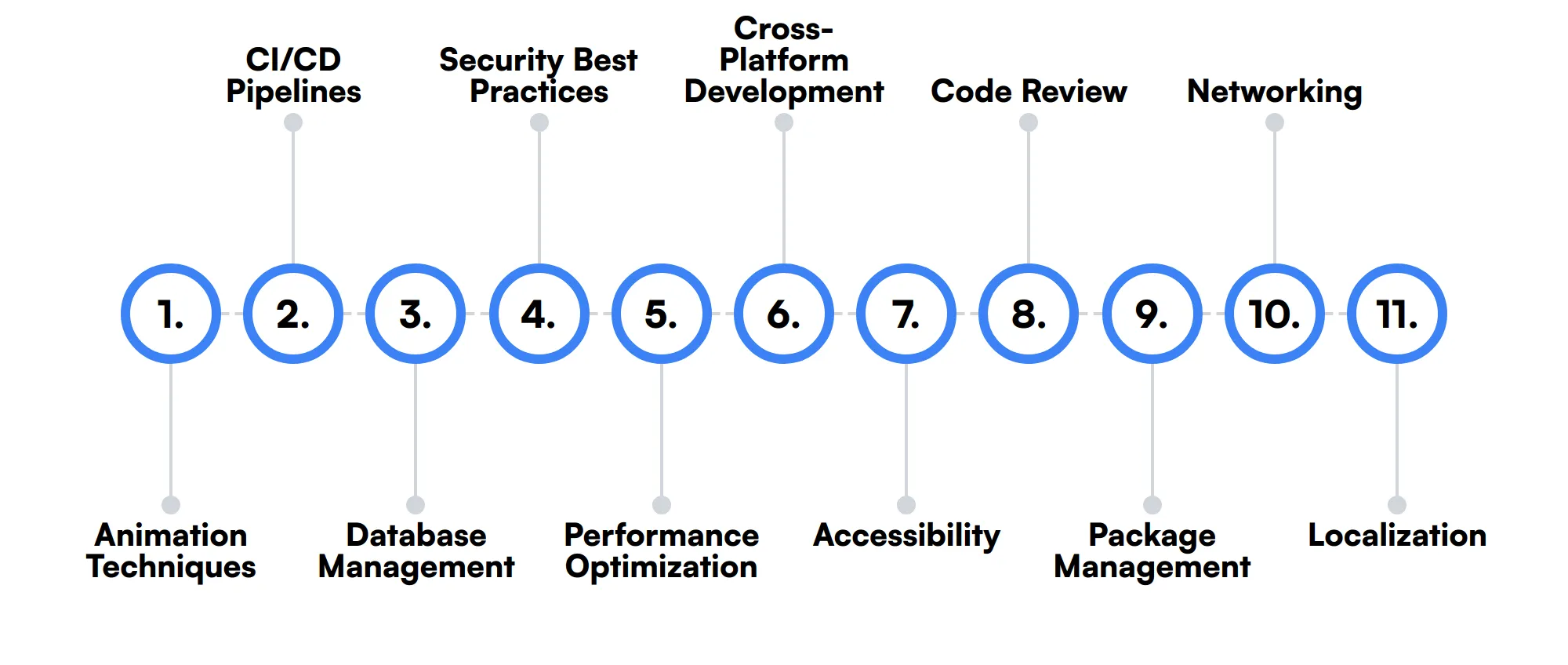
Animation Techniques
Understanding animation techniques can help in creating engaging and interactive user interfaces. Flutter developers can leverage built-in animation libraries to add smooth transitions and effects to their apps.
CI/CD Pipelines
Continuous Integration and Continuous Deployment (CI/CD) pipelines automate the process of testing and deploying applications. Familiarity with CI/CD tools can streamline the development workflow and ensure timely releases.
Database Management
Knowledge of database management, including both SQL and NoSQL databases, is useful for handling data storage and retrieval. Flutter developers often need to integrate local databases like SQLite or cloud databases like Firestore.
Security Best Practices
Implementing security best practices is important to protect user data and ensure app integrity. Flutter developers should be aware of common security vulnerabilities and how to mitigate them.
Performance Optimization
Optimizing app performance is crucial for providing a smooth user experience. This involves techniques like reducing app size, minimizing load times, and ensuring efficient memory usage.
Cross-Platform Development
Flutter is known for its cross-platform capabilities. Understanding the nuances of developing for both iOS and Android, and how to handle platform-specific code, is beneficial for a Flutter developer.
Accessibility
Creating accessible applications ensures that all users, including those with disabilities, can use the app effectively. Flutter developers should be familiar with accessibility guidelines and how to implement them.
Code Review
Participating in code reviews helps maintain code quality and fosters knowledge sharing within the team. Flutter developers should be comfortable giving and receiving constructive feedback on code.
Package Management
Managing dependencies and third-party packages is a common task. Flutter developers should know how to use tools like pub.dev to find, install, and update packages efficiently.
Networking
Understanding networking concepts is important for handling data exchange between the app and external services. This includes knowledge of HTTP requests, WebSockets, and handling network errors.
Localization
Localization involves adapting the app to different languages and regions. Flutter developers should know how to implement localization to make their apps accessible to a global audience.
How to assess Flutter Developer skills and traits
Assessing the skills of a Flutter developer involves more than just glancing at their resume. It's about understanding how well they can use their knowledge in real-world applications. The key to a successful assessment lies in evaluating both technical prowess and the ability to apply these skills effectively.
When looking for a Flutter developer, it's important to consider their expertise in areas like Dart programming, the Flutter framework, and UI/UX design, among others. However, knowing the list of skills is just the start. The challenge is in measuring how well a candidate can leverage these skills to build responsive, user-friendly applications.
To streamline this process, consider using Adaface assessments, which are designed to mirror the actual challenges a developer will face on the job. These assessments help in identifying candidates who are not only technically proficient but also excel in applying their knowledge practically, thereby potentially improving the quality of your hires.
Let’s look at how to assess Flutter Developer skills with these 6 talent assessments.
Dart Test
Our Dart Test evaluates a candidate's proficiency in the Dart programming language, covering a wide range of fundamental and advanced topics.
The test assesses their understanding of Dart Basics, Variables and Data Types, Control Flow, Functions, Object-Oriented Programming, Collections, Error Handling, Asynchronous Programming, and Testing and Debugging. It includes 5 Dart MCQs and 1 Dart Coding Question.
Successful candidates demonstrate a strong grasp of Dart's syntax and concepts, showcasing their ability to write and debug Dart code effectively.
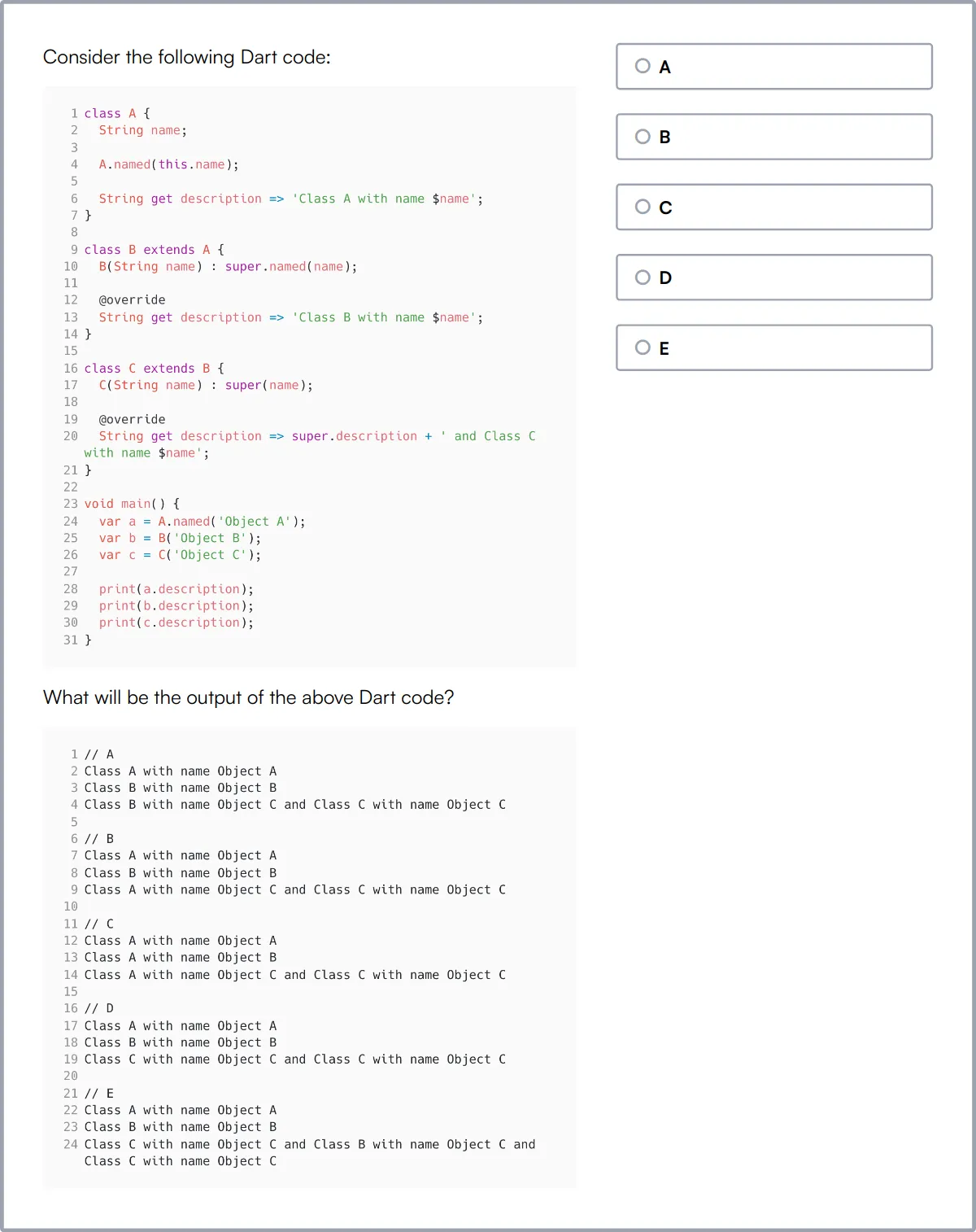
Flutter & Dart Test
Our Flutter & Dart Test assesses a candidate's ability to design, build, and debug adaptive Flutter apps, along with their knowledge of the Dart programming language.
The test covers Dart programming, Flutter internals, State management, Handling forms and media, Networking and handling data, Animations and transitions, Navigation between screens, Debugging and testing, and Publishing and distribution. It includes 7 Flutter MCQs, 5 Dart MCQs, and 1 Dart Coding Question.
Candidates who perform well demonstrate proficiency in using Flutter widgets, managing app state, and integrating native device features, indicating their readiness to develop and maintain complex Flutter applications.
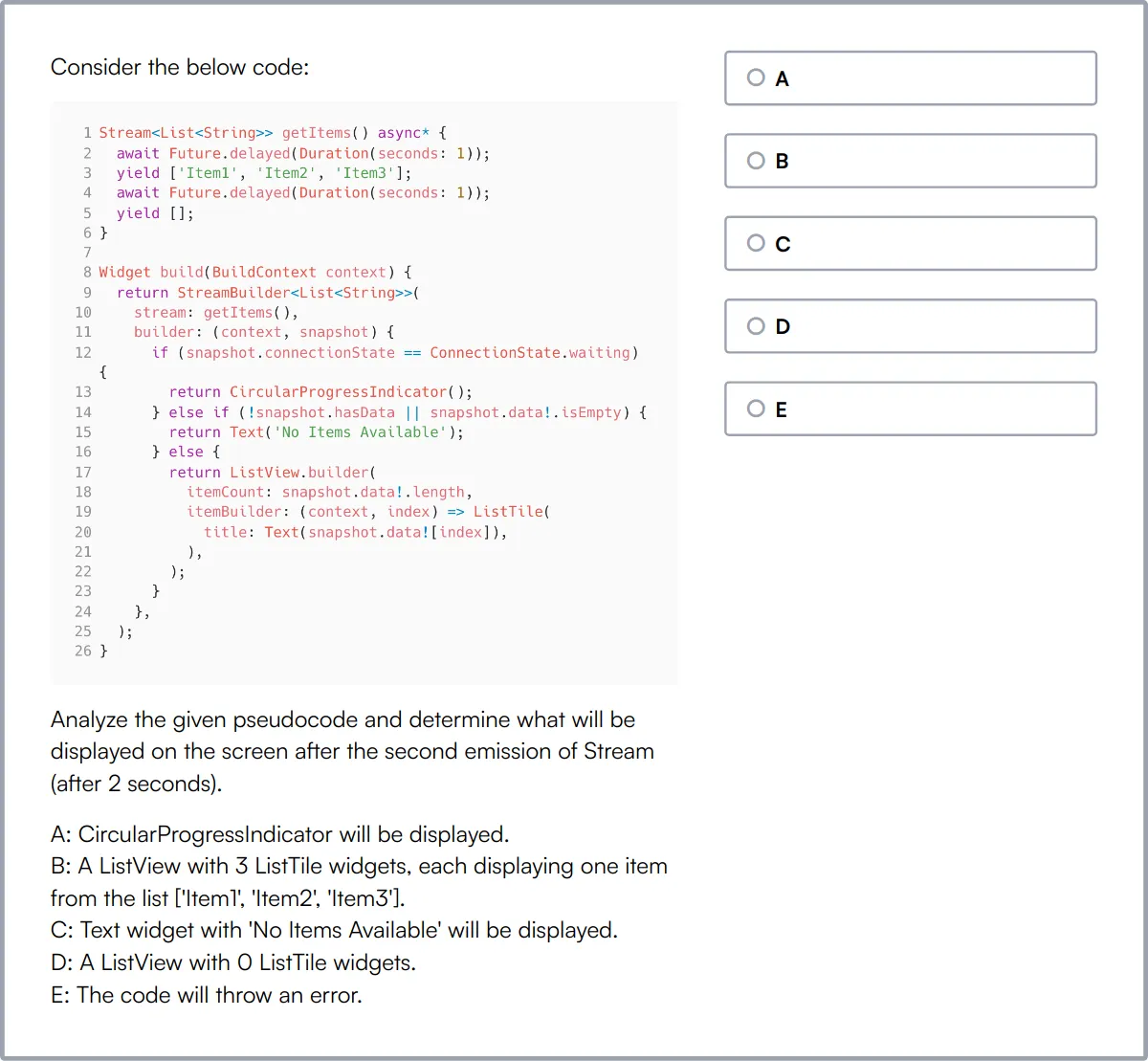
UI/UX Design Test
Our UI/UX Design Test evaluates a candidate's skills in creating user-friendly and visually appealing designs, focusing on both UI and UX principles.
The test assesses their understanding of Design thinking, UX design principles, Wire-framing, Landing pages, Customer journey, UI fundamentals, A/B testing, User research techniques, Interaction design principles, Visual design principles, Information architecture, Mobile app design considerations, Accessibility guidelines and principles, UX writing and content strategy, and Human-computer interaction (HCI) fundamentals. It includes 14 UI/UX MCQs.
High-scoring candidates show a deep understanding of user-centered design, effective communication of design ideas, and the ability to create intuitive and accessible user interfaces.
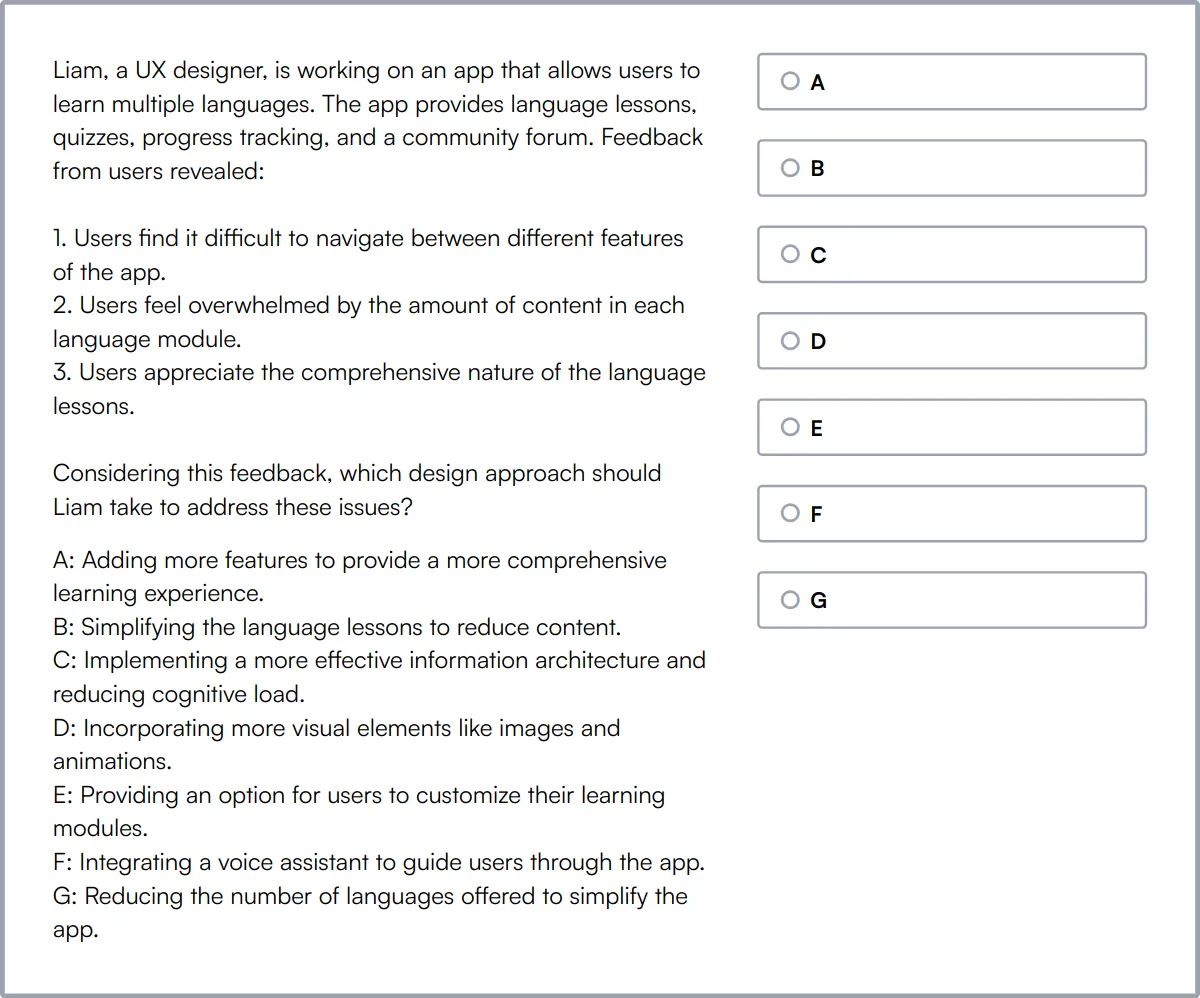
REST API Test
Our REST API Test evaluates a candidate's understanding of RESTful APIs and their ability to create, interact, and test them.
The test covers REST API Basics, API Design, Best Practices, Designing Backend Services, and Coding. It includes 5 REST MCQs, 5 Technical Aptitude MCQs, and 1 Coding Question.
Candidates who excel in this test demonstrate a solid grasp of REST principles, HTTP methods, and best practices for designing and consuming APIs, indicating their capability to build and maintain robust backend services.
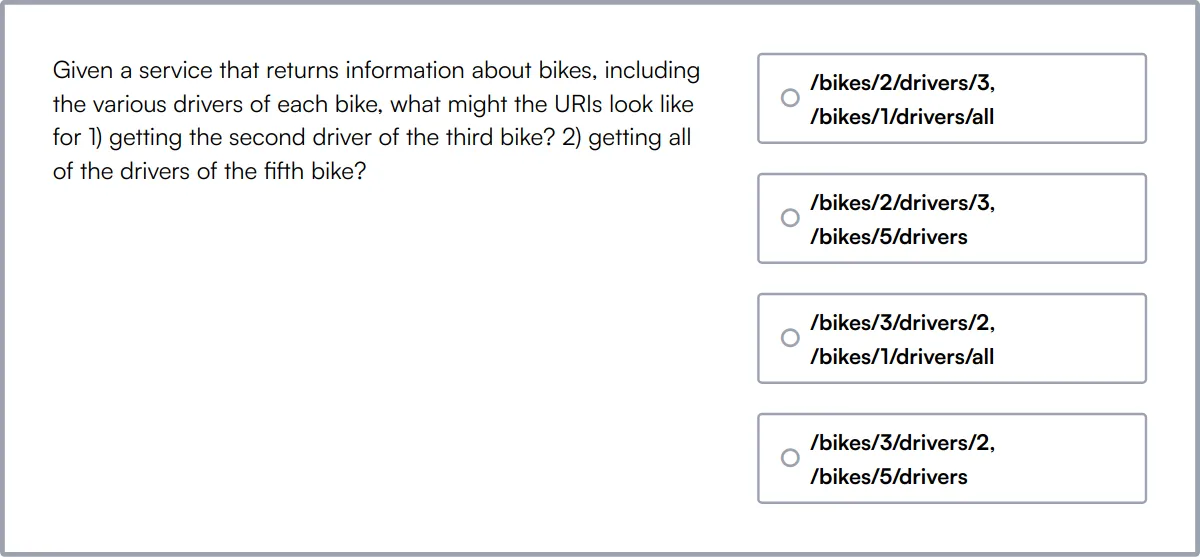
Git Online Test
Our Git Online Test evaluates a candidate's understanding of Git, a popular version control system, through scenario-based MCQs.
The test covers Git basics, Repository creation, Branching and merging, Committing changes, Conflict resolution, Remote repositories, Rebasing, Git workflows, Git commands and concepts, and Git branching models. It includes 10 Git MCQs.
Successful candidates demonstrate proficiency in using Git commands, managing source code, and resolving conflicts, showcasing their ability to collaborate effectively in a development team.
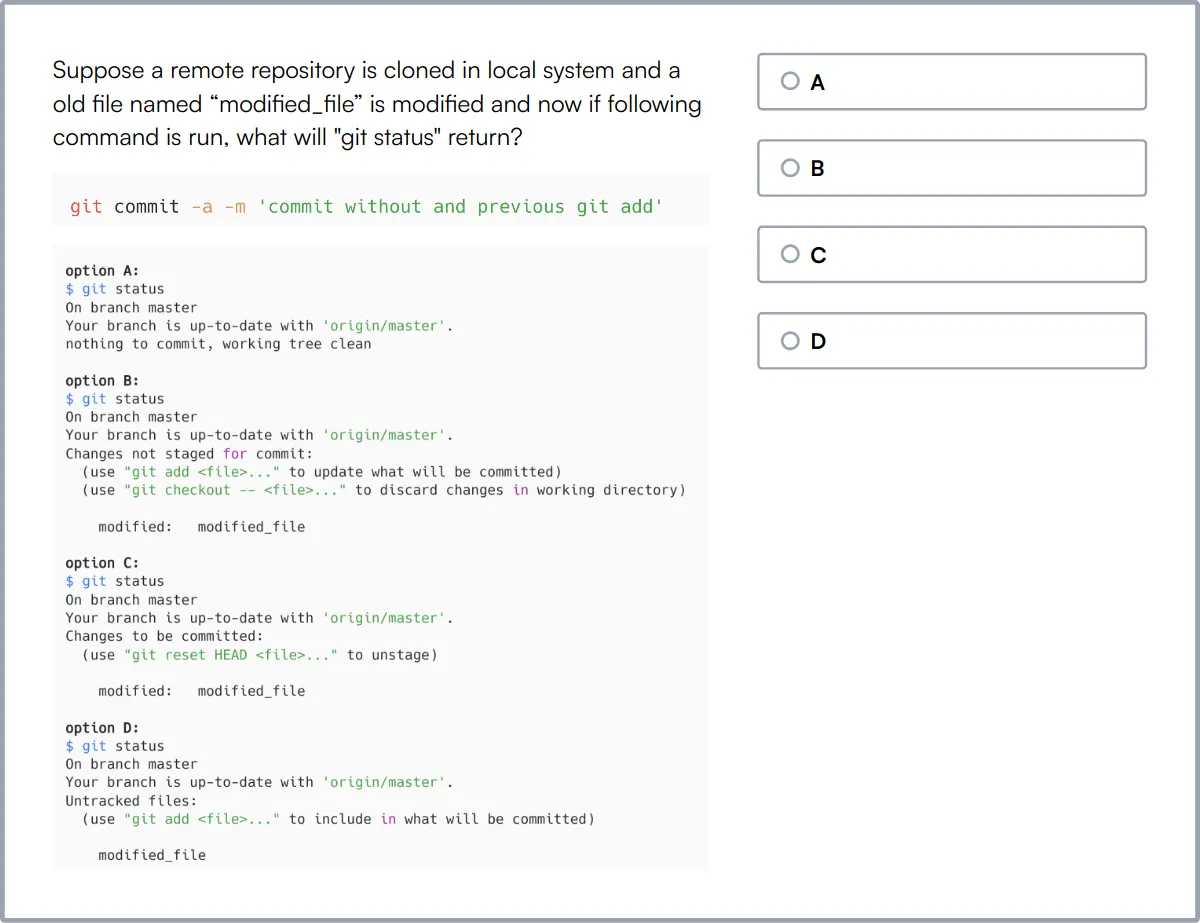
Manual Testing Online Test
Our Manual Testing Online Test evaluates a candidate's knowledge of manual testing, focusing on their ability to identify defects in software products.
The test covers Manual software Testing, Testing Fundamentals, Test Case Writing, Test Plan Development, Test Strategy, Test Management, Documentation Skills, Testing Types, Mobile App Testing, and Penetration Testing. It includes 10 Testing MCQs, 3 Penetration Testing MCQs, 2 Program Testing MCQs, and 3 Mobile App Testing MCQs.
Candidates who perform well demonstrate strong skills in designing and executing test cases, managing bug reports, and applying various testing methodologies, indicating their readiness to ensure software quality.
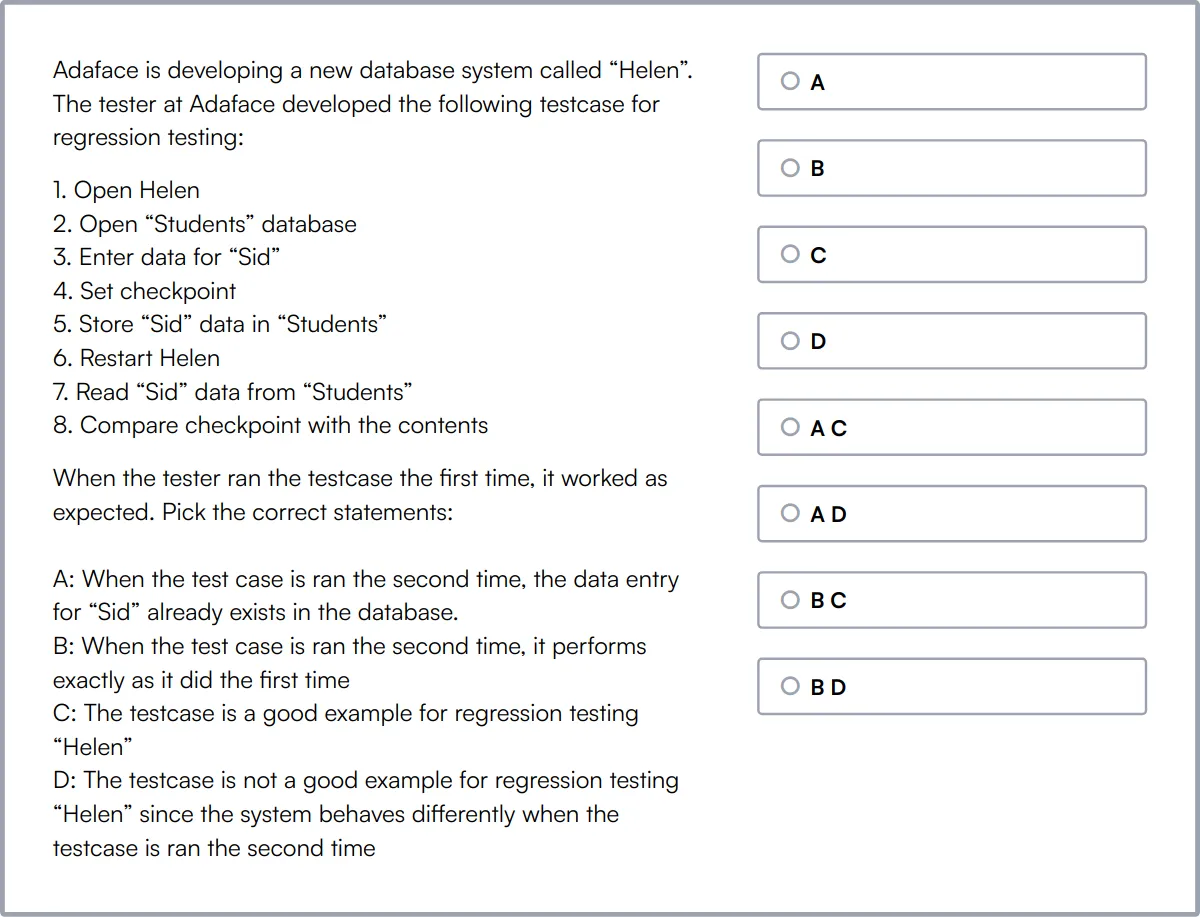
Summary: The 9 key Flutter Developer skills and how to test for them
| Flutter Developer skill | How to assess them |
|---|---|
| 1. Dart Programming | Evaluate a developer's proficiency in Dart syntax and problem-solving skills. |
| 2. Flutter Framework | Assess familiarity and efficiency with Flutter components and lifecycle management. |
| 3. State Management | Check understanding and implementation of various state management solutions in Flutter. |
| 4. UI/UX Design | Review the ability to design intuitive and appealing user interfaces. |
| 5. API Integration | Test skills in connecting and utilizing web services and APIs. |
| 6. Version Control | Observe how a developer uses tools like Git for code management. |
| 7. Testing and Debugging | Determine ability to write tests and debug application issues. |
| 8. Responsive Design | Evaluate creation of designs that adapt to different device screens. |
| 9. Firebase Integration | Assess skills in implementing Firebase services for backend operations. |
Flutter & Dart Test
Flutter Developer skills FAQs
What are the key skills required for a Flutter Developer?
A Flutter Developer should be proficient in Dart programming, understand the Flutter framework, and have skills in UI/UX design, state management, and API integration. Knowledge of version control, testing, debugging, and responsive design are also important.
How can recruiters assess a candidate's proficiency in Dart for Flutter development?
Recruiters can assess Dart proficiency through coding tests, reviewing past projects, and asking specific questions about Dart's features and syntax during interviews. It's also useful to check understanding of asynchronous programming and stream handling in Dart.
What is important in UI/UX design for Flutter apps?
For Flutter apps, UI/UX design should focus on creating intuitive and user-friendly interfaces. Assessing a candidate's ability to design accessible, aesthetically pleasing applications that provide a seamless user experience across different devices and screen sizes is key.
Why is state management important in Flutter development?
State management is critical in Flutter to ensure that the app's interface reacts properly to user inputs and system changes. It helps in managing the app's state in an organized way, leading to more maintainable and scalable code.
How to evaluate a Flutter Developer's skills in API integration?
To evaluate API integration skills, recruiters can look at candidates' experience with consuming web services and integrating third-party APIs in Flutter apps. Questions about handling JSON data, managing network requests, and using packages like http can be insightful.
What testing and debugging skills should a Flutter Developer have?
A Flutter Developer should be skilled in writing and running unit tests, widget tests, and integration tests using the Flutter testing framework. Familiarity with tools like Flutter DevTools for debugging and profiling an app is also important.
How does Firebase integration enhance Flutter applications?
Firebase provides backend services like authentication, databases, analytics, and hosting, which are essential for rapid app development. Knowledge of setting up Firebase, configuring it within a Flutter app, and using its services effectively is beneficial.
What should recruiters look for in Flutter Developers regarding performance optimization?
Recruiters should look for candidates who understand how to use Flutter's profiling tools, can optimize battery life and app responsiveness, and know techniques for reducing app startup time and memory usage.

40 min skill tests.
No trick questions.
Accurate shortlisting.
We make it easy for you to find the best candidates in your pipeline with a 40 min skills test.
Try for freeRelated posts



